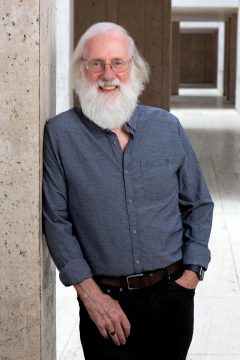
FORSKNINGSSEMINARIUM. Torsdag 16 maj gästas vår föreläsningsserie Sahlgrenska Science Seminar Series av en synnerligen framstående cancerforskare: Tony Hunter, professor vid the Salk Institute for Biological Studies i San Diego. Han kommer ge presentationen ”A journey from tyrosine to histidine phosphorylation: uncovering new cancer mechanisms” klockan 13:00 i hörsal Arvid Carlsson, Medicinaregatan 3. Föreläsningen kan också följas live via Zoom. Välkommen!

Professor Ruth Palmer ser mycket fram emot Tony Hunters föreläsning:
– Han är en gigant inom sitt område och har vunnit många internationella priser inom cancerforskning. Han har aldrig varit i Göteborg förut. Efter att han varit här kommer han att hålla ett andra seminarium i Uppsala, där jag vet att salen kommer att vara full! Låt oss se till att fylla salen även här i Göteborg!
Professor Tony Hunter har kunnat bjudas in tack vare utlysningen Wenner-Gren Foundations Distinguished Lecture.
TOPIC

Tony Hunter: A journey from tyrosine to histidine phosphorylation: uncovering new cancer mechanisms
TIME – Thursday May 16th, 13:00-14:00
VENUE – Lecture Hall Arvid Carlsson, Medicinaregatan 3, or via Zoom: https://gu-se.zoom.us/j/69427221961
Professor Tony Hunter’s lab at the Salk Institute for Biological Studies in San Diego has made many seminal scientific contributions, including in the areas of tyrosine phosphorylation, cell cycle regulation, phosphodependent Prolyl Isomerases, RING Domain E3 Ubiquitin Ligases and studies of the “kinome”. He has an extensive track record in investigating signaling pathways initiated by receptor tyrosine kinases and discovered tyrosine phosphorylation as a new principle of protein regulation, showing that aberrant tyrosine phosphorylation is a major mechanism of oncogenic transformation. This discovery subsequently led to development of a new class of cancer drug, known as TKIs, directed against oncogenically activated tyrosine kinases. TKIs are widely used for targeted cancer therapy, and, currently, >80 TKIs are approved for clinical use. For many years, his laboratory has studied the roles of phosphorylation and other posttranslational modifications in cell proliferation, the DNA damage response, and cancer, and analysed phosphorylation, ubiquitylation, and sumoylation-based cellular signaling pathways in normal and cancer cells. In particular, he has studied the role of protein kinases and tyrosine/serine/threonine phosphorylation events in the responses of normal cells to stimulatory signals and investigated how cancer cells rewire their phosphorylation networks to proliferate and survive.
In his more recent work, the Hunter lab has focused on the role of cellular crosstalk between stromal cells and tumor cells in the tumor microenvironment (TME) in pancreatic adenocarcinoma (PDA), and, in particular, the contributions of pancreatic cancer stromal cells, known as cancer-associated fibroblasts (CAFs), in PDA progression. His goal has been to identify paracrine factors secreted by activated CAFs in the tumor tissue that act on the tumor cells and can be targeted for therapeutic purposes. These studies identified the LIF (leukemia inhibitory factor) cytokine, secreted by activated CAFs, that acts on tumor cells to promote survival and maintain stemness, thereby serving as a driver of PDA progression. Moreover, therapeutic targeting of LIF by a neutralizing anti-LIF monoclonal antibody in a mouse model of PDA prolongs survival and increases sensitivity to chemotherapy, implicating LIF signaling as a therapeutic resistance mechanism. LIF levels are high in human PDA tissue, with high LIF levels correlating with disease progression. Serum LIF levels are also elevated in PDA patients and correlate with disease stage, suggesting that LIF could be a useful PDA biomarker, as well as a target for combination PDA therapy.
Most recently, he has studied phosphorylation of histidine in proteins, an understudied posttranslational modification, using 1-pTza and 3-pTza phosphohistidine (pHis) analogue-containing peptides to generate a collection of monoclonal antibodies (mAbs) that are selective for either the 1-pHis or 3-pHis isoform of pHis. These mAbs were used to investigate a possible role for histidine phosphorylation in cancer, showing that elevated histidine phosphorylation is a potential driver of hepatocellular carcinoma and pediatric neuroblastoma. In ongoing work, his group is investigating a role for histidine phosphorylation in triple negative breast cancer and pancreatic cancer, and in particular its possible role in the formation and function of invadopodia structures in neuroblastoma cell invasiveness.
In addition to his ongoing research activities, Tony Hunter has served on numerous Scientific Advisory and Editorial Boards and is frequently invited to give Keynote lectures at international conferences. He is also the recipient of numerous prestigious prizes, including the 2022 AACR Lifetime Achievement Award in Cancer Research, the 2018 Tang Prize for Biopharmaceutical Science, the 2018 Pezcoller Foundation-AACR International Award for Cancer Research, the 2017 Sjöberg Prize in Cancer Research, the 2014 Royal Medal, Royal Society of London, the 2005 Wolf Prize in Medicine and the 2004 American Cancer Society Medal of Honor.











Skriv en kommentar